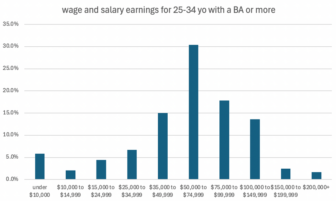As readers of Michigan Future’s work know, we have suggested for years that Michigan should look to Minnesota as a model for how to create a prosperous state economy. On every measure of economic well being it is the best in the Great Lakes.
For the details check out our two latest reports: State Policies Matter and The New Path to Prosperity.
The main difference between Michigan and Minnesota is the performance of its big metros: Minneapolis compared to Detroit and Grand Rapids. The growing and high wage knowledege-based sectors of the economy are concentrating in big metros. As are college educated adults which is the asset that matters most to economic success in the knowledge economy. Metro Minneapolis is a top tier big metro, metro Detroit and Grand Rapids are in the bottom tiers. End of story!
Successful big metros are anchored by vibrant central cities. Where college graduates––particularly Millennials before they have children––are increasingly concentrating. The City of Minneapolis is one of the nation’s most successful central city.
Articles by the Atlantic and Issue Media Group explore why Minneapolis has become so prosperous. The Atlantic story is subtitled: “No other place mixes affordability, opportunity, and wealth so well”. They write:
Only three large metros where at least half the homes are within reach for young middle-class families also finish in the top 10 in the Harvard-Berkeley mobility study: Salt Lake City, Pittsburgh, and Minneapolis–St. Paul. The last is particularly remarkable. The Minneapolis–St. Paul metro area is richer by median household income than Pittsburgh or Salt Lake City (or New York, or Chicago, or Los Angeles). Among residents under 35, the Twin Cities place in the top 10 for highest college-graduation rate, highest median earnings, and lowest poverty rate, according to the most recent census figures. And yet, according to the Center for Housing Policy, low-income families can rent a home and commute to work more affordably in Minneapolis–St. Paul than in all but one other major metro area (Washington, D.C.). Perhaps most impressive, the Twin Cities have the highest employment rate for 18-to-34-year-olds in the country.
Derek Thompson, the author of the Atlantic article, credits metro Minneapolis’ business tax based sharing as the prime driver of the region’s extraordinary success. (We explored that policy in our State Policy Matters report.)
The Issue Media Group article is entitled: Why Minneapolis is the new capital of ‘The North’. Brian Martucci, the article’s author, credits the city’s focus on quality of place as the chief driver of its success. Particularly in becoming a magnet for young talent. He writes:
Homegrown success stories include: accelerating business and population growth in Summer in the City, downtown Minneapolis core neighborhoods; a comprehensive, goal-driven vision for the future; cutting-edge models of community-building and place making in formerly disinvested neighborhoods; and a wholesale embrace of arts and culture in the public planning process.
… Minneapolis policymakers have taken (former Mayor) Rybak’s directive to heart, progressively amending the city’s Plan for Sustainable Growth to encourage higher-density development around the University of Minnesota, the Lake Street corridor and the Green and Blue METRO light rail lines, and making small but important zoning changes like the Granny Flats Amendment, which permits self-contained rental units on owner-occupied lots zoned for single- or two-family use.
Like New York City, Minneapolis is more evidence that the low cost/small government places have the best economies conventional wisdom is wrong. Minnesota is the highest tax state in the Great Lakes. Minneapolis––the city and region––are so successful because they have used public resources to create a place where talent wants to live and work.
Talent––not low taxes––is the key to economic prosperity. Minneapolis has learned that lesson, we haven’t. They are prosperous. Its almost certain we won’t be until we learn that lesson.






